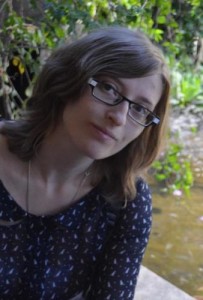 Hosťovská online prednáška
Hosťovská online prednáška
26. mája 2021 o 14.00
Translatologička a výskumná pracovníčka Dr. Eugenia Kelbert Rudan je držiteľkou postdoktorandského štipendia Leverhulme v Britskom centre pre literárny preklad na University of East Anglia a zároveň pôsobí ako odborná asistentka na Vysokej škole ekonomiky v Moskve (v súčasnosti na prerušenom úväzku). Študovala filozofiu a translatológiu na Sorbonne, francúzsku a nemeckú filológiu v Oxforde a porovnávaciu literatúru na Yale. Za svoju dizertáciu Acquiring a Second Language Literature: Patterns in Translingual Writing from Modernism to the Moderns (2015) pod vedením Hauna Saussyho a Vladimíra Alexandrova získala cenu Charlesa Bernheimera od Americkej asociácie porovnávacej literatúry. Pôsobí ako aktívna členka Centra pre multilingvizmus na Univerzite v Osle (MultiLing), Centra pre digitálne humanity DARIAH v Belehrade a ITEM CNRS (Institut de textes et manuscripts modernes) v Paríži, kde sa podieľa na vývoji kolaboratívneho nástroja pre výskum porovnávacej štylistickej analýzy Bukvik http://bukvik.litterra.net/. Na pozvanie Ústavu svetovej literatúry SAV predstaví svoj výskum na online prednáške pod názvom Romain Gary’s Collaborative Self-Translation and the Translational. Podujatie bude prebiehať v angličtine s prezentáciou vo francúzštine, diskusia prebehne podľa potreby po anglicky, nemecky, francúzsky a po rusky. Pripojiť sa môžete cez zoomový kanál https://zoom.us/j/93192496899?pwd=dG5NZDVEVy9vMnBHR1dpQVlOaVB0UT09.
FOTO – https://complit.yale.edu/, Jean Claude Pierdet / INA / Getty
ABSTRAKT: This talk focuses on the possibility of translational processes beyond translation through a genetic editing approach to an understudied phenomenon in translation studies, which I call collaborative self-translation (CST), i.e. a self-translator’s practice of involving a hired translator to provide an initial translation of an entire work, later to be revised extensively by the author. With a focus on Romain Gary and to a lesser extent Vladimir Nabokov as its case studies, it argues that an inductive extension of our notion of the translational can shed light on the ways in which our notions of the translational may meaningfully extend beyond translation and thus offer a pathway to distinguishing between literal and metaphorical use of translation in literary theory. It thus suggests a potential alternative to existing translational discourse in interdisciplinary settings, as well as presenting a view of collaborative self-translation as a practice that can be fruitfully theorized within multiple paradigms in translation studies.
Le présent discours fait une critique génétique d’un phénomène sous-étudié que j’appelle l’autotraduction collaborative afin de considérer la possibilité et la nature de processus traductifs au-delà de la traduction proprement dite. Je comprends sous ce terme la pratique d’engager un traducteur professionnel pour produire une traduction initiale d’un texte entier, destinée par la suite à être révisée, voir réécrite, par l’auteur. La présente étude considère de près le cas de Romain Gary (ainsi que, dans une certaine mesure, celui de Vladimir Nabokov) pour soutenir qu’une extension inductive de notre notion de processus traductif peut offrir une voie pour distinguer entre l’extension littérale et métaphorique de la terminologie traductologique dans le domaine littéraire. Elle fournit ainsi une alternative potentielle aux discours de traduction dans des contextes interdisciplinaires, tout en présentant une vision de l’autotraduction collaborative en tant que pratique théorisable d’une façon fructueuse au sein de multiples paradigmes traductologiques.
Доклад рассматривает возможность переводного процесса вне перевода как такового. С помощью генетического подхода к рукописным материалам, анализируется коллаборативный автоперевод (CST), малоизученное явление в переводческих исследованиях, подразумевающее изначальный перевод всего произведения с целью последующей авторской редактуры. На примере Ромена Гари и, в меньшей степени, Владимира Набокова, прослеживается индуктивное расширение понятия перевода и переводного процесса. Таким образом, данный анализ предлагается как возможный подход к различию между буквальным и метафорическим определением „переводного“ в литературоведении, а также как пример возможного применения коллаборативного автоперевода в рамках нескольких парадигм в теории перевода.
